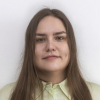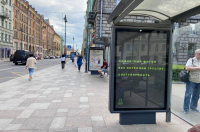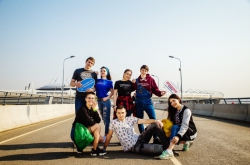This season, the majority of projects submitted to ITMO.STARS focused on AI and software, as well as mobile and network products. Other popular fields included infochemistry, biotechnologies, wireless technologies, and theoretical and experimental physics.
Among the winning projects are an innovative network, a new type of antibiotics, and a system that automatically rotates solar cells towards light.
Kirill Kostenko, one of the winners, presented a prototype of the social network D’art, which is set up as an interactive space instead of a conventional feed: users can choose to publish their content (images, video, games, or even online stores) in any vacant part of the “field.” Posts can be made with templates or from scratch using a built-in neural network or HTML code.
“ITMO.STARS offers applicants an opportunity to present their ideas in front of professionals, get feedback, and, of course, enter a high-ranking university. That’s why I devoted my final year at school to this project, which meant I had to actively communicate with people who could share some useful information. It’s this opportunity to find a team and supervisor for my research that became my most valuable gain at ITMO.STARS. I am planning to polish my concept and join the university’s acceleration programs,” says Kirill Kostenko.

Kirill Kostenko. Photo by Dmitry Grigoryev / ITMO.NEWS
Another winner, Artem Lavrentiev, focused on developing a new type of antibacterial treatment. This solution addresses one of the main questions of modern pharmacology – antibiotic resistance, which is the acquired tolerance of bacteria to antibiotics that used to be effective in treatment. The new medication suggested by Artem promises to more effectively deal with bacteria and the diseases they cause.
“For me, ITMO.STARS was the only chance to showcase my knowledge – and I couldn’t miss it. It wasn’t easy for me to combine studies, practicing for exams, and working on my research. However, the most difficult stage was waiting for the results. Thanks to the competition, I learned to work with specialized software and big data. Most importantly, however, I met people who could help me continue my research, and learned how the research pipeline at ITMO works even before I got in. I think this will be of significant help during my studies here,” shares Artem Lavrentiev, a student in the Bachelor’s program Infochemistry.

Artem Lavrentiev. Photo by Dmitry Grigoryev / ITMO.NEWS
Winner Amir Nabiullin suggested a new engineering solution to increase the efficiency and performance of solar cells. He presented a model of a system that automatically rotates solar cells along the Sun’s trajectory. Such solar trackers can increase a cell’s output by 25-35%.
“When I met the committee, I realized that ITMO’s School of Physics and Engineering is a place where I can find like-minded people, where student projects aren’t just for fun – they can be turned into useful products with the guidance of supervisors. As I prepared for the interview, I was reading a lot on the topic of my research, learning things that aren’t taught at school along the way. But my main takeaway from participating in ITMO.STARS is that you have to believe in yourself, work hard, strive to learn more, and then you will succeed. My dream came true thanks to ITMO.STARS!” says Amir Nabiullin, a student in the subject area Technical Physics.

Amir Nabiullin. Photo by Dmitry Grigoryev / ITMO.NEWS
In a year, the winners will once again meet with the committee to present the progress on their projects that they’ve achieved under the guidance of the university’s supervisors.
In 2024, ITMO.STARS received a total of 213 applications, with the majority of them coming from students in Moscow and Moscow Oblast, St. Petersburg and Leningrad Oblast, Novosibirsk, Kemerovo, and Chelyabinsk. Among the winners, the subject area Infocommunication Networks and Communication Systems became the most popular, with four of them choosing to study programs within it; the subject areas Applied Computer Science and Chemical Technologies were chosen by two students each; and one student each favored Technical Physics, Biotechnologies, and Information Systems and Technologies.
As always, the competition was open to all school graduates in the current year who are Russian citizens, have received minimal Unified State Exam scores, completed their school education, and don’t already have a higher education degree.
The competition included several rounds. In the first round, participants filled in their applications with detailed descriptions of their projects, their desired program at ITMO, and a motivation letter explaining why they should win. Next, a committee chose the best candidates, paying attention to the difficulty of the project or study, its compliance with the applicant’s chosen field, and its potential. Finally, the selected participants had to pass an interview.
ITMO.STARS, a competition aiming to support talented applicants with lower Unified State Exam scores, has been held at ITMO since 2018 – offering tuition-free positions to more than 60 young talents in total.





